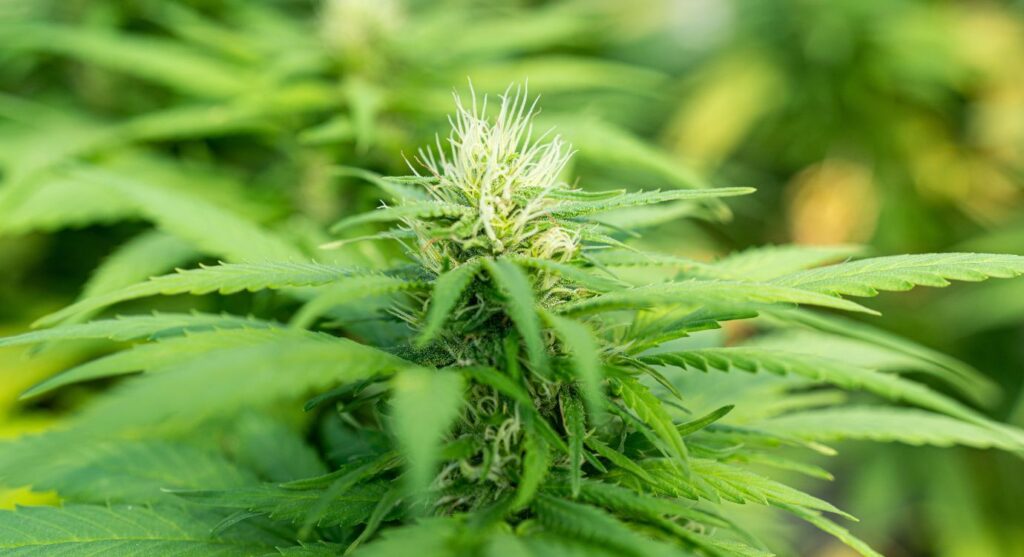Free delivery on all orders over £45
Free delivery on all orders over £45

Medically reviewed by
When it comes to cannabinoids, CBD and THC are like annoying younger siblings: they’re pretty great at hogging all the attention.
But more than 150 different cannabinoids have been identified in cannabis and hemp plants, all compounds with their own structures, all of which may carry their own respective benefits, too.
In this guide, we’re taking a look at one of these less known compounds: CBN – and how it compares to our better-known friend – CBD.
Read on to discover:
Let’s take a closer look at what each cannabinoid is, how they may interact with our bodies, and what their differences are.
CBD, otherwise known as cannabidiol, is a non-psychoactive phytocannabinoid found in both cannabis and hemp varieties of Cannabis Sativa L.
CBD is legal in the UK, so long as it is extracted from the hemp plant and contains less than 1mg of THC.
Hemp farmers have to stick to strict regulations, and products now have to adhere to FSA guidelines before making it onto UK shelves.
Despite this, CBD has made its mark on the wellness industry in recent years – the UK’s CBD market alone is expected to be worth almost £1 billion by 2025.
CBD is an anti-inflammatory and an antioxidant. There is also ongoing research investigating how CBD may help those living with chronic pain.
It is thought that CBD’s benefits stem from the way this cannabinoid is able to interact with the endocannabinoid system (ECS) – a complex network of cells and receptors, present in humans and most animals.
The theory is that CBD can boost the ECS, helping it do the vital job of maintaining balance and homeostasis in our bodies.
Early research in support of this theory looks promising, but more studies are needed in all areas before clinical conclusions can be drawn.
A few other benefits of CBD include…
The World Health Organisation has confirmed that CBD is safe for public use and poses no potential for abuse.
More and more people around the world are trying CBD every day, and it has a great track-record for safety, with millions regularly using cannabidiol products.
Read more: Is CBD oil addictive?
CBD is one of the few cannabinoids that’s available in a variety of forms. Since results have been promising from early studies, many companies have infused all sorts of products with CBD.
CBD is now available in the following forms:
There really is something for everyone. However, depending on the type of CBD you use, the effects garnered, and bioavailability will differ.
CBD is also legal in many countries around the world – due to its confirmed safety status and lack of psychoactive effects.
In contrast, CBN and THC are still illegal in many countries.
Read more: CBD legal countries
CBN, or cannabinol, is a cannabinoid with a similar structure to CBD.
CBN was the first naturally occurring cannabinoid to be isolated in its pure form – back in 1896.
CBN is actually the product of oxidation: THC breaks down when exposed to heat and light, leaving CBN.
CBN, in some senses, acts like a weaker, less psychoactive version of THC – while less potent, the compound can still be mind-altering.

Research on CBN is scarce, particularly when it comes to human clinical trials. However, some preclinical studies suggest CBN may be therapeutic in a few ways.
CBN appears to have effects similar to those of THC. CBN acts on the body’s CB1 receptors, though in a much milder sense, as CBN also favours our CB2 receptors, too.
One study found that rats given CBN had an increased appetite – just as they do when given THC. This is in direct opposition to the effects of CBD, which caused rats to experience a reduction in appetite.
CBN may also be a potent antibacterial agent. In lab settings, CBN was tested on strains of MRSA bacteria that are resistant to traditional antibiotics. Researchers found CBD to be a potent antibacterial agent against MRSA bacteria that were resistant to traditional antibiotics.
More research into the potential of CBN as an antibacterial is needed, but as antibiotic resistance grows, there may be a place in the future for CBN in the fight against bacterial infections.
Meanwhile, studies also point to the benefits of combining CBD and CBN. Research from 2019 found that rats experience relief from chronic muscle pain disorders such as fibromyalgia – without experiencing side effects – when given both CBD and CBN.
Read more: CBD oil for fibromyalgia
This may be a result of the entourage effect – a theory which explains the tendency for cannabinoids such as CBD and CBN to be of greatest therapeutic value when consumed together.
10% off on your first order
Complete this one-minute quiz and find the right products for you.
Both cannabinoids work by activating and interacting with our endocannabinoid system.
Yet, despite the two cannabinoids coming from the same cannabis plant, they are quite different.
The differences between CBD oil vs CBN oil include:
The FDA has approved a CBD product, Epidiolex, to help reduce seizures, in particular those triggered by epilepsy.
The UK government has not officially approved any product for medical use. However, the approval of Epidiolex by the FDA is a promising sign.
CBD, unlike CBN, is legal in the UK and in many other countries around the world.
CBN is psychoactive, although much milder than THC, and so unlikely to produce the ‘high’ associated with cannabis use, which is the reason given for it being regulated as a classified substance around the world.
It is fair to say that CBD has received interest – much more research has been carried out into this comparatively mainstream cannabinoid. As such, there is now almost universal recognition for CBD’s wellness-promoting benefits.
This doesn’t mean that CBN isn’t harbouring its own secrets and potential uses. It just means that for now, this cannabinoid has been far less studied.

There’s been significantly more research carried out on CBD when compared with CBN, meaning we’re less sure when it comes to the latter.
Without many clinical studies – particularly on humans – it’s difficult to know exactly how CBN might impact us.
CBD is thought to be very safe, as is generally well tolerated in most people.
However, we do know of two risks associated with CBN.
CBN is often marketed as a sleep aid, and this may be why: drowsiness could potentially be a side effect of CBN – especially when it is combined with CBD.
CBD taken on its own, however, will not make you drowsy.
One study found that consuming CBN resulted in a positive THC test – this was the case with two different types of drug tests.
Even more concerningly, with one of these tests, CBN produced an “additive effect” – meaning it essentially increases the appearance of THC in your system.
So, even if you had initially intractable amounts of THC in your system, the presence of CBN could skew your THC levels higher, resulting in a positive drug test.
CBD may also trigger a positive drug test, although it is far less likely.
People choosing full spectrum CBD oil, which contains traces of THC up to 0.2%, are most at risk of this. With broad spectrum CBD, the THC has been removed, whereas CBD isolate contains CBD purely and so will not trigger a positive drug test.
Read more: CBD drug tests
“Is CBN legal? Can I buy CBN UK?”
No, CBN is not legal in the UK.
While the winds of change are certainly blowing when it comes to cannabis regulation globally, THC and CBN both remain illegal in the UK.
Because CBN is made via oxidation rather than through genetics, you also wouldn’t be able to purchase high CBN cannabis strains; legal or not.
If you were looking to consume high levels of CBN, you’d simply have to allow THC to oxidise.
CBD is currently more popular than CBN, and we know a lot more about it. For now, we’re sticking with our favourite cannabinoid, CBD – as it’s both legal and accessible.
CBN may have neuroprotective properties, and may protect ageing brain cells. One study found that CBN worked by protecting mitochondria within the neurons.
CBN is already being marketed as good for anxiety, but more studies are needed. CBN has also been shown to have sedative properties, which may in turn help with anxiety.
While this is clearly another example of ‘more research, please!’ preliminary studies have shown early evidence that supports the use of CBN as a painkiller, an anticonvulsant, an anti-inflammatory, and antibiotic.
We’re a long way from drawing any clinical conclusions, but we suspect we’ll be seeing a lot more of this cannabinoid in years to come.
Sign up for the Evopure newsletter:
This product is not for use by or sale to persons under the age of 18. It should not be used if you are pregnant or nursing. Consult with a physician before use if you have a serious medical condition or use prescription medications. A Doctor’s advice should be sought before using this and any supplemental dietary product. This product is not intended to diagnose, treat, cure or prevent any disease.
© Evopure Ltd. All rights reserved Terms & Conditions Cookie Policy Sitemap